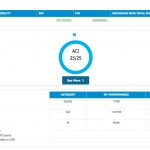Hundreds of rheumatology providers across the country are finalizing submissions for the first year of reporting under the Merit-Based Incentive Payment System (MIPS). According to a presentation at the 2017 ACR/ARHP Annual Meeting in San Diego, providers that participate in and submit through the Rheumatology Informatics System for Effectiveness (RISE) Registry are poised to perform…






